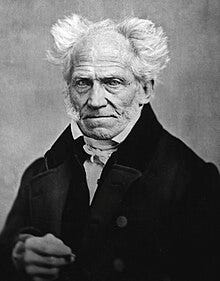#14 - Is life terrible and meaningless?
Schopenhauer was right about many things, but he drew the wrong conclusions!
There are times when I feel utterly drained by entropy—the relentless force that keeps us struggling, day after day. No matter how we feel, we must rise each morning and fight to maintain the life we have built. On top of that, we endure illness, workplace struggles, conflicts in our relationships and countless other challenges. And the moment we stop fighting, everything begins to fall apart.
I recently had one of those days, the kind that makes you question everything. I found myself reflecting on the Buddhist idea that life on earth is characterized by suffering and we are trapped in a wheel of life, death and rebirth. To make matters worse, I stumbled upon the works of Arthur Schopenhauer, the infamous German philosopher and master of pessimism. The more I read, the more his words weighed on me. His insights into life’s struggles and meaninglessness seemed to be unsettlingly accurate.
However, there are certain aspects where I disagree with Schopenhauer. But first, let’s take a deep dive into the darkness.
The world according to Schopenhauer
Arthur Schopenhauer (February 22, 1788 – September 21, 1860) was a German philosopher best known for his influential work “The World as Will and Representation”. In his book, he portrays the phenomenal world as a mere expression of a blind, irrational will that is shaping reality beyond human perception. Schopenhauer also was one of the first Western philosophers to embrace and endorse key principles of Indian philosophy and Buddhism, including asceticism, the denial of the self and the concept of the world as mere appearance.
According to Schopenhauer, the world is inherently bad—an unfortunate mistake. He argues that if it were even slightly worse, it would cease to be. In such a world, the existence of a loving God is inconceivable, as no benevolent deity would allow such relentless suffering to persist.
Humans, like all living beings, are driven by a single force: the “blind will to live”. This will is universal, manifesting in everything from the tiniest insect to the most complex creatures. It operates instinctively, compelling all beings to survive, struggle and propagate—regardless of reason or purpose.
He calls the will “blind” because it serves no higher purpose beyond perpetuating life—driving us to survive for a time, reproduce and ultimately die. It is blind in the sense that it operates without awareness or reason, endlessly striving without realizing that it is the very source of its own suffering. This cycle of pain and desire continues indefinitely, with no ultimate goal or resolution.
The will is amoral—it operates without any ethical considerations. As humans, we are not inherently “better” than animals; we are simply more complex manifestations of the same blind force.
According to Schopenhauer, life consists of the following sufferings:
Our needs—whether for food or other necessities—are the root of our suffering. The moment we lack what we need, we experience discomfort, longing or even despair.
Even if all our needs are met for a moment, we start worrying about the future— and hence we never truly live in the present.
As soon as we have nothing left to worry about and could theoretically relax, boredom sets in—life lacks inherent meaning as we endlessly cycle between desire and boredom.
Humans like all beings have to fight, compete with and kill others in order to survive, creating endless suffering.
Finally, when all the suffering ends, we are dead.
Schopenhauer is pessimistic not only about individual lives but also about humanity as a whole. While ethical and enlightened individuals exist, they remain a minority, while in his view fools determine the course of history. He also rejects the existence of God, attributing belief in a higher power to humanity’s deep-seated metaphysical need for meaning.
Schopenhauer sees three ways to make life less miserable:
A temporary escape from this suffering can be found in aesthetic contemplation and art. When we immerse ourselves in a beautiful painting or music, we momentarily forget our individuality, freeing ourselves from desires, fears and the burdens of existence.
The tranquilization of the will—a state achieved through deep metaphysical insight. This realization exposes individuality as nothing more than an illusion.
For Schopenhauer, the only lasting way to diminish suffering and to experience unity is through a life of meditation, asceticism and chastity—a path that leads to the dissolution of the will and the ego. However, he acknowledges that only a rare few are capable of fully achieving this mental state.
I have a more optimistic view on life
Although I relate to Schopenhauer’s pessimistic view—especially on bad days—I find it overly negative. In my opinion, certain aspects of life provide deep meaning and the strength to resist entropy every day:
Having children and grandchildren is one of life’s greatest fulfillments. Though often exhausting, they bring profound meaning and teach us unconditional love. I can’t help but feel that only someone without children could hold such an overwhelmingly negative view of life.
If someone doesn’t have children for any reason, there are still many ways to help others. Helping others creates a deep sense of connection and offers true fulfillment and meaning in life.
Prayer and meditation allow us to deeply understand life and its interconnectedness. As we progress, we gradually let go of our egos, bringing an end to suffering. In this way, despite its hardships, life on earth can serve as a beautiful training ground for growth and enlightenment.
LOVE
Let me know what you think
Want to engage?
Please subscribe and join my community, if you would like to engage in deeper discussions about this or any topic related to healing and awakening. My paid subscribers have access to personal coaching via Chat, and Gold Members get one hour of personal coaching via Teams/Zoom per year on top.
I also offer personalized coaching sessions on spiritual topics and powerful techniques that have helped me and many others before—let them be a resource for you as well on your path of healing and awakening. Just reach out!
The Path of Healing and Awakening is a reader-supported publication. To receive new posts and support my work, consider becoming a free or paid subscriber.






